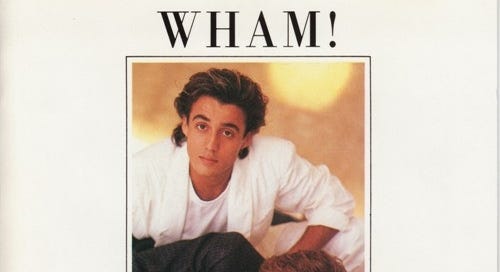There are a thousand reasons why we came back to England.
The proximate reason was that America chose a malevolent conman to be their president and I didn’t want to live in a country that would do a thing like that. On the day that the GOP selected Trump to represent them as their leader, we made a family vow that ‘if Trump wins in November, we are going home.’ The morning after the election, we started making our plans and less than a year later, we were living in Bristol.
However, the seeds were planted several years before.
I’ve been an avid follower of Alain de Botton’s School of Life since the beginning. About ten years ago, Botton wrote an article comparing the post-Wham! careers of George Michael and Andrew Ridgeley. After Wham! split up, George went from triumph to triumph while Andrew faded into obscurity to live on a farm in the countryside.
A casual observer might decide that George had found the golden path to success while Andrew had slipped down the greasy pole into failure (this was before George had his legal problems and his, er, death). We’ve been taught by society, and not least by the pop industry that made George and Andrew famous, that fame and riches are the highest goods available to us and to achieve them means we have succeeded in life. But, on the brink of success, Andrew Ridgeley chose a different path. According to Botton, ‘In fact, it is Andrew who has been successful.’
This essay had a profound effect on me. At the time, I was still climbing the greasy pole in Silicon Valley and not enjoying it very much. The 2 x 90 minutes in the car every day and the tiny, tiny house on the edge of civilisation were not things I’d chosen and the idea that I could trade ambition (plus 3 hours in traffic) for comfort suddenly seemed very attractive. It took a few years before the idea became a plan but, once it did, I felt totally liberated.
I had one nagging doubt though. Once I’d made the decision, I remember the same song playing in my head over and over.
All the stars
That never were
Are parking cars
And pumping gas.
Do you know the way to San Jose?
by Hal David and Burt Bacharach.
Even when you know that you are headed for a better life, the siren song of success wants you to feel like a failure.
We’ve been learning about existentialism in my philosophy class at the Open University. Jean-Paul Sartre claims that we always have choices — even when society and convention and family obligations say that we don’t — and that we are condemned to choose. No excuses! Even to choose not to choose is a choice. For Sartre, to pretend that you have no choice is to live in ‘bad faith’. To live an authentic life you need to acknowledge that you have choices and that the choices you make fit with the life that you want to live and not the life that someone else thinks you should live.
Andrew Ridgeley chose to withdraw from the limelight to live in pastoral bliss when conventional wisdom was telling him that he should be reaching for the stars. Andrew chose to live authentically and to choose his own path regardless of what society said he should be choosing.
That’s what I want. I want to live authentically. Not how someone else thinks I should live.
☕️ Buy me a coffee? ☕️
It won’t make me rich but it’ll make me happy.






I now know a smidgen more about Andrew. All I know of George is he was a deeply charitable man, ie didn't make a fuss about giving, he wrote great pop songs and sang them beautifully. Sure, he had demons, who doesn't? By the way, he put Andrew's name as co-writer on Careless Whispers, thus ensuring his mate had a royalty stream for life, even though George was the sole writer and performer. Good luck to Andrew, George's memory is a fond one. He was a funny, sassy, vulnerable star and I miss the music unwritten at his death.
Rather ignores the fact he was pretty wealthy when took his fork in the road. I’m not sure how a Deliveroo driver with a family goes about being authentic. His life is a hard scrabble to better his condition. Authenticity is something you can worry about when you’re well over half way up maslow’s hierarchy of needs. Most of humanity isn’t.